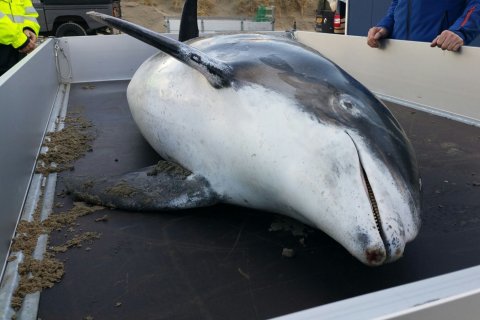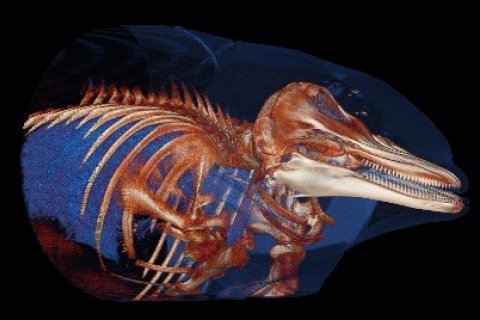Blood poisoning proved fatal for white-beaked dolphin
Acute brain damage, did not suffer for long

The white-beaked dolphin that was washed onto the beach of Wijk aan Zee (North-Holland) on 8 December died of acute brain damage caused by bacterial blood poisoning. This is concluded by researchers of the Faculty of Veterinary Medicine. The animal, an adult male, was well fed. On top of that, dietary tests by Wageningen Marine Research show that the dolphin had recently caught plenty of fish. “All of this means that the animal died soon after the bacteria had reached the brain,” says Lonneke IJsseldijk, coordinator of the research into beached marine mammals at the Faculty of Veterinary Medicine.
Bacteria
The medical examiners from Utrecht had already ascertained that the animal had brain defects. When they examined these under a microscope, the acute brain damage was discovered. They also saw that several internal organs in the chest and abdomen were infected by one and the same bacteria (for instance, the dolphin also had pneumonia).
This led to the conclusion that the animal had contracted blood poisoning. IJsseldijk says: “The moment the bacteria reached the brain through the blood circulation is when the fatal brain damage was caused. How the animal was infected is unclear.”
Whiting
The remains of over one hundred fish were found in the stomach, especially whiting. This was shown through dietary testing by Wageningen Marine Research. All the meat had been digested. This means the animal had not eaten for at least several hours before his death. Aside from that, no plastic had been found in the gastrointestinal tract.
Age investigation
The dolphin is believed to be relatively older. “In order to determine the exact age, we have to count the growth rings in the teeth,” IJsseldijk explains. “But that won't be done before January 2018.”

CAT scan
In the afternoon of 8 December, right after the dolphin arrived at the Faculty of Veterinary Medicine, a CAT scan was made. This test, a world first, did not show any skeletal defects.
The Instagram account Stranding Research regularly shows photos of research by researcher Lonneke IJsseldijk into stranded marine mammals.

